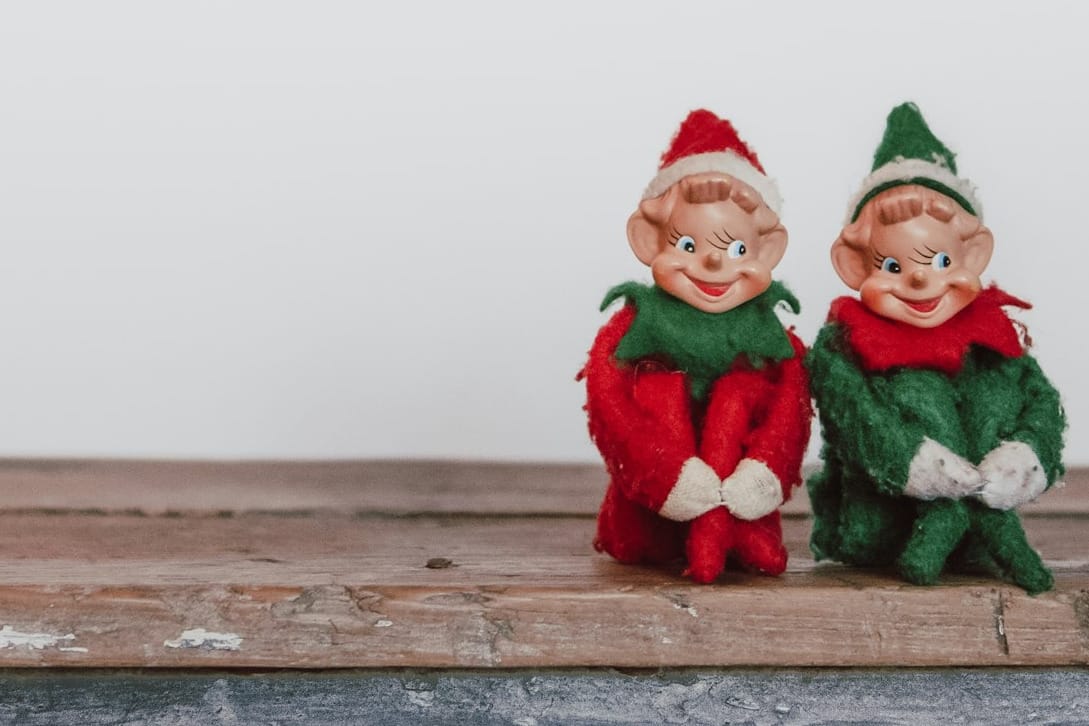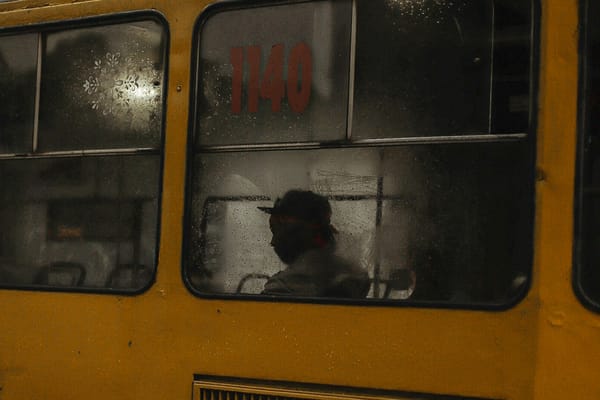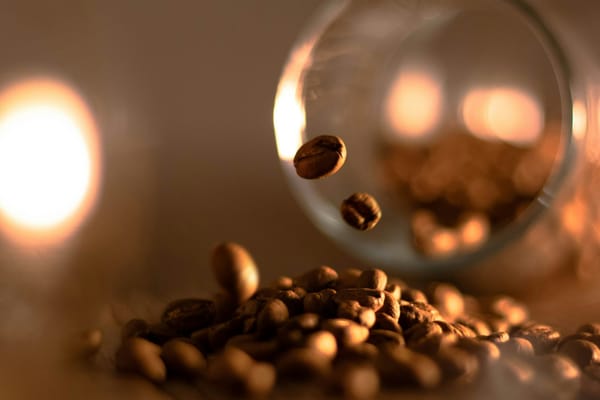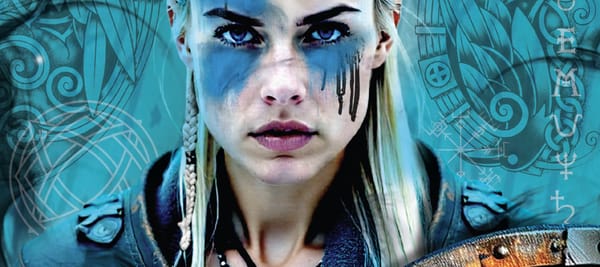SHORT STORY: White Christmas by Kate Baucherel
Originally published in Harvey Duckman Presents... Volume 12, December 2019

Originally published in Harvey Duckman Presents... Volume 12, December 2019
© Kate Baucherel 2019
Rosie had always dreamed of a white Christmas. Sometimes she crept up the rickety ladder into the attic and sought out the dark corner where her grandmother’s old books were stored, safe in the dry and the dark. She sat in a pool of torchlight, inhaling the heady smell of dusty paper, and gazed at pictures of a lost world. How did it feel, she wondered, to look out at your familiar garden and see it carpeted in white? It could never happen in her lifetime.
“Rosie?”
She closed the book with a tinge of regret and crept out of her nest, going down the old ladder carefully step by step. Her mother was at the bottom, frowning.
“I’ve told you about going up there without me or daddy,” she scolded. “It’s dangerous to climb the ladder by yourself.”
Rosie pouted and kicked at the bottom rung. “I like it up there.”
Her mother rolled her eyes. “Don’t take that attitude with me, young lady. Come with me. I have a surprise for you.”
Mystified, Rosie followed her mother down the hall. At the door stood a tall brown parcel. Written clearly on the label was her name. She touched it, confused. “What is it?” she asked.
“I don’t know,” replied her mother. There was a note of tension in her voice. “It’s come from the Corporation. You’d better open it. Here, I’ll help you.”
Pulling a corner of the box open, Rosie peered inside. A shaft of light illuminated incongruously jolly red and green colours, and Rosie felt the excitement welling up inside her.
“Mummy! It’s an elf! I’ve got a Christmas elf!” She pulled harder, tearing a hole in the cardboard, and reached out to touch the pointed hat which sat at a jaunty angle on the little elf’s head. As she did so the bot came suddenly to life, stimulated by the light falling on its solar cells. A pair of intense blue eyes flicked on and stared at her, as cold as mythical ice. Rosie jumped backwards with a scream and ran behind her mother. The bubble of excitement burst, and fear blossomed.
“Send it back,” she wailed. “It’s scary.”
Her mother knelt down and held her tight. “I can’t, darling,” she whispered in her daughter’s ear. “You’ll understand when you’re bigger.” Giving Rosie a last squeeze, she turned back to the parcel. “You’re right, sweetheart,” she said brightly, pulling the box fully open. “It’s an elfbot, and we only have two weeks to go until the Solstice. Aren’t you lucky! What shall we call it?”
“You can call me Jolly,” said the elfbot. It turned its head and its cold blue stare fell on Rosie. “Hello, Rosie. Will we be best friends?”
Rosie’s mother nudged her. “Yes,” she stammered, trying hard not to cry. This was not the Christmas elf she had imagined, and she did not know what to do.
For the first week, Rosie avoided the elfbot as much as she could. Her mother said nothing when she crept up the ladder to the attic, but the hideaway had lost its magic. The comforting smell of the old books seemed to have been replaced by a dusty dryness, and she sneezed when she opened the pages. The northern nights were drawing in as they approached the winter Solstice and it was already dark by mid-afternoon. Rosie was unsettled and found no pleasure in her usual games. When not in the attic, she sat listlessly in her bedroom while cartoons played on her wallscreen, and all the time the memory of the cold blue eyes of the elfbot made her shiver.
It didn’t help that her father though the bot was marvellous. Each morning Rosie awoke to his deep laughter as he found the elf in yet another incongruous pose. On Monday, it was wearing his jacket and waiting at the front door. On Wednesday, he asked the shower to turn on and the hidden bot flew out of the cubicle with a whistle of surprise to avoid the sudden jet of water. On Friday, he found it making angel wing patterns in the middle of a pile of spilled cereal on the kitchen floor, its eyes blinking winsomely at him.
“Ho, Ho, Ho,” he laughed. “Rosie, why aren’t you playing with this elf? Santa Claus is listening!” He paused. “Maybe it’s for the best, though. Your mother wouldn’t like it.”
Rosie looked at him solemnly and carried on eating her breakfast. She did not want to play with the elf and could not understand why it had been sent to her. She thought back to the last Solstice when they lived in their old house in the city down by the bay. Some of the children she knew there had been sent elfbots, and everyone said that the more you played with the bot, the more Solstice presents you got. That was before they moved to their new little house, isolated at the end of a dirt track, high on the hills above the city. Rosie loved their new home, but she wished that she could watch new cartoons instead of the same old stories over and over, and she sometimes missed being at school. As she ate her cereal, Rosie thought about the bot and her mother’s nervousness when the parcel arrived. What harm could come from asking for a new cartoon?
Rosie didn’t get the chance to ask that day, or the next. Her mother kept her busy with weekend chores. The wooden deck outside the front door was thick with dust blowing in from the valley, and Rosie swept the boards with her little brush and dustpan. High on the roof a drone cleared the same dust from solar cell receptors and turbine bearings so they could draw as much energy as possible from the sun and wind in the short winter day. Above them to the west the black slopes of the mountain soared to the sky, and far below them to the east Rosie could see a glint from the waters of the bay. A breeze ruffled the normally calm surface which hid drowned houses and streets that had succumbed to the rising tides.
A moving shadow made Rosie looked up: a solar plane was gliding silently overhead, its long wings catching the sun’s rays and flexing with the updraft from the hills.
“Mummy!” she called.
Her mother looked up sharply, then relaxed. The plane was passing to the east, and she could make out its livery: the rainbow colours of WorldWatch, not the stark white of the Corporation. The plane was surveying the changing world, officially gathering data on the loss of coastlines and vegetation, but also collecting evidence of malpractice by the Corporation and others.
“It’s okay, darling,” said her mother, shading her eyes as she watched the plane to the southern horizon. “Tell you what, shall we have lunch outside? A special picnic, just the two of us.”
Rosie clapped her hands happily. “What about Daddy? Can’t he come?”
Her mother shook her head. “No, darling. You know he has to work.” She glanced down the track where the tell-tale reflection of rooftop solar cells betrayed a distant cluster of buildings: a few homes, a medical office, and a fully connected co-working hub. Rosie’s father went there every day to be bombarded with web content which even the Corporation’s army of artificial intelligences could not filter. He worked hard for his coins, wiping the social streams clean of indescribable horrors, shielding users from the worst that the extremes of society could dream up. Moving to the calm of the hill house had helped to ease his nightmares. Going offline had added an extra layer of protection for his family, although while he wanted to limit what could come into the home, his wife was more concerned about what might go out, what might be discovered about them.
The sun was high in the sky as Rosie and her mother lay, laughing, on a blanket in a sheltered corner of the garden, out of sight of the house. If any passerby had chanced upon the mountain track, they might have seen at the window a pair of icy blue eyes scanning the landscape, searching for the child.
Monday came, and the elf continued to vie for attention. It hovered above the table, turning somersaults in the air and catching its hat like a circus performer. Rosie watched and, despite herself, tried not to giggle. The elf caught her eye and winked. She was so distracted by its antics that she did not notice her parents whispering urgently to each other.
“They’ve cut my pay,” said her father in a low voice. “They’ve stopped access to my accounts.”
“They can’t,” replied her mother quietly, with a confidence she did not feel. “It’s our money.”
“Not really,” he said wearily. “Corporation pay, Corporation currency. What can we do?”
“We’ve got savings outside the Corporation,” said her mother fiercely. “We don’t need them.”
“We don’t have enough to live. We’ll have to give them what they want.”
The two adults turned to look at their child who was watching the elf bot with rapt amusement, her eyes shining. Her mother’s shoulders sagged. “I thought we were safe here,” she whispered.
Rosie looked at her parents uncertainly. Her mother composed herself and her father smiled at her. “That elf is a laugh, I tell you,” he said loudly. “What is it up to now, eh?” He swigged the last of his drink and walked to the window, peering out at the breaking dawn. “I have to go to work. It looks like it’s going to rain. Rosie, why don’t you stay in today and play with your elf?”
Rosie looked at her mother, who nodded, forcing a smile. “What a good idea. I have a few things to get on with.” She walked out of the room without another word.
The elf turned a last somersault, pulled its pointy hat firmly down over its ears, and landed neatly on the chair next to Rosie. It gazed at her with its big eyes, which Rosie now saw were the deep blue of the sky before dusk, not the cold ice that had first frightened her. She felt a little better.
“What shall we do?” it asked innocently. “Will you show me your toys?”
Rosie grinned and jumped down from her chair. “Come on, Jolly. I can show you my attic, and we can watch some cartoons, too.” She scampered out of the room, and the elfbot glided silently after her.
The days were getting very short now: it would be dark again in six hours’ time, and Rosie knew that the Solstice must be close. She wondered if what the other children had said was true, that having an elfbot meant you got more presents. Would it be rude to ask outright?
“What do you want most in the world?” asked Jolly, lounging on a box next to Rosie’s precious books.
“I want to have a White Christmas, like this,” said Rosie, brandishing a picture. “I think that’s the same as the Solstice. Can Santa make it snow?”
The elfbot rocked and blinked. “Santa can do anything,” it said, “but it only snows in the Antarctic, and on the highest mountains. Do you want to go there?”
“No, silly,” laughed Rosie. “I can’t leave Mummy and Daddy.”
“Tell me about your mummy,” said Jolly. “Does she like to have friends visit?”
“Sometimes,” said Rosie eagerly. “People who lived in our old street come to visit, and my friend Charlie and his mummy.”
The elfbot blinked. “That’s very good, Rosie. What about your aunts and uncles?”
“I don’t have any aunts. Uncle Scott went away,” said Rosie. “He went to watch the world, I think.” She frowned. “That sounds silly.” Then she brightened. “Mummy says he’s coming for Solstice.”
“That’s nice, Rosie.” The elfbot did a little dance, making her giggle. “Did you say you wanted more cartoons?”
Rosie looked up hopefully at the elf. “Oh yes. I would love some. I’ve watched all the files we have over and over again.”
Jolly turned a somersault in the air and doffed its hat. “For you, anything.”
Rosie’s father pushed the door open cautiously. It was already dark outside but there were no lights on in the house. He felt a knot of worry forming in his stomach. “Sarah?” he called softly. “Rosie?”
“I’m here, Mo.” The whisper came from the gloom of the kitchen. “Rosie’s upstairs.”
Sure enough, there was a chink of light coming from the attic, and he could hear his daughter’s tinkling laugh. “She’s playing with the elf?”
“Best of friends.” Sarah switched on the light and turned towards the stove, clattering saucepans. Under cover of the noise of cooking, they were able to talk normally.
“They’ve lifted the block on our savings accounts,” said Mo.
“Dammit. I mean, that’s a good thing, but we should have a choice about what we share with the Corporation. Why do they have to pry into every corner of our lives?”
“It’s harmless, really. We don’t have anything to hide.”
His wife rounded on him, brandishing a wooden spoon. “You may think so, but I don’t like having my entire life laid bare for the Corporation.” She looked at the spoon in her hand and laughed ruefully. “If we stay private, we protect others. I mean, I’m sure Scott doesn’t want all of his WorldWatch activity front and centre, and I bet there are things we know about our friends which they prefer to keep to themselves.”
“Your brother’s very good at staying under the radar,” said Mo reassuringly. “I keep an eye on his feeds. You’re being very sensitive about all this. Relax. It’s almost the Solstice.”
“You’re right, I suppose.” Sarah shrugged. Walking to the bottom of the ladder that led to the attic she raised her voice. “Rosie! Time for supper.”
Her daughter clambered carefully down the ladder. The blue eyed elfbot hovered in the air and glided silently downwards. A shiver ran up Sarah’s spine.
“Mummy, we’ve been having loads of fun. Jolly says I can have new cartoon disks at Solstice, and more toys, and sweets too.”
Sarah shot a worried look at Mo, then smiled disingenuously at her daughter as she felt the elfbot’s eyes on her. “You are a lucky girl. I’m glad you’ve had fun. Now, wash your hands.”
The next few days were wet and cold, and Rosie took full advantage of the freedom from chores to play with the elfbot that had so frightened her at the start. Jolly was the perfect companion for a little girl starved of company. She told Jolly about her wishes and fears, her life high on the mountain, and the things she missed from the town. Jolly asked about her parents and friends and family, and she answered everything truthfully. In return, the elfbot assured her that Santa was listening and that there would be gifts galore coming to the house on the hill.
Rosie’s parents were preparing for the Solstice, too. Drone deliveries arrived daily bearing treats for dinner and gifts to be wrapped. Her father strung coloured lights along the deck and around a tree in the garden and cleaned the barbecue grill with one eye on the weather. Her mother set the cleaning drones to work throughout the house, tidying systematically and making up the spare room for guests. There was a sense of growing excitement even for the adults which overcame the lingering unease of the elfbot’s continuous scrutiny.
As the sun set, Rosie and her parents stood outside the front door, watching the mountain silhouetted against the sky as it turned from pale blue to gold, reflecting off the wispy clouds, then disappearing in the darkness. The lights on the tree twinkled. It was too early to go to bed. Rosie wanted to go to sleep straight away, impatient for the dawn to come, but her mother kept her occupied in the kitchen, helping to make last minute cakes and treats.
“When is Uncle Scott coming?” she asked.
“Later, darling,” her mother replied. She glanced at the clock, frowning. “I think you can go to bed now. Scott will be here when you wake up.”
Rosie cheered and wrapped her arms around her mother’s waist. “Thank you, Mummy. I love you. Happy Solstice.” She scampered towards her bedroom. “Goodnight, Daddy,” she called. “Goodnight, Jolly.”
It was still dark when her father woke her. “Ssssh, Rosie. Time to get up. It’s almost sunrise.” He pulled a tee-shirt over her head and ruffled her hair. Together, they walked out into the darkness of the garden. The only lights were two unblinking blue eyes high on a branch, watching their every step. Rosie thought she could see the shape of boxes under the tree: had Santa been?
Her mother was waiting at the end of the garden, gazing out to the eastern horizon. Rosie peered around, concerned. “Where’s uncle Scott?”
“He’s late,” replied her father. “He’ll be here soon.”
The deep, deep red of the dawn reflected on the waters of the bay, turning them to a rippling pool of blood. “Red sky in the morning…” muttered her father under his breath. The colours danced and lightened as the golden disc of the sun peeked above the waves.
“Happy Solstice,” squealed Rosie.
As the glow on the horizon brightened, she felt a breeze on her bare neck. She turned away from the breaking dawn and stood speechless, mouth open in surprise. A cloudswarm of tiny white drones was flying high over the garden. They began to descend in a chaotic flurry, white flakes swirling down to cover the grass. As they came closer, the wonder of the dancing drones took her breath away. They started to settle on the ground, covering the familiar garden in a carpet of white.
“It’s a White Christmas!” Rosie raised her arms and whirled around in the falling snow. “Santa brought me a White Christmas! Thank you, Jolly! Thank you!” Her outstretched hand caught a drone and she gazed at it on her palm, a perfect snowflake which would never melt.
Rosie turned in delight to look at her mother, and realised for the first time that she was crying.
First published in December 2019 in Harvey Duckman Presents... Volume 12.
All rights reserved. No part of this work may be reproduced, stored in a retrieval system or transmitted, in any form or by any means, electronic, mechanical, photocopying, recording and/or otherwise without the prior written permission of the author.
Find out more about Kate Baucherel, her work, books and writing at:





